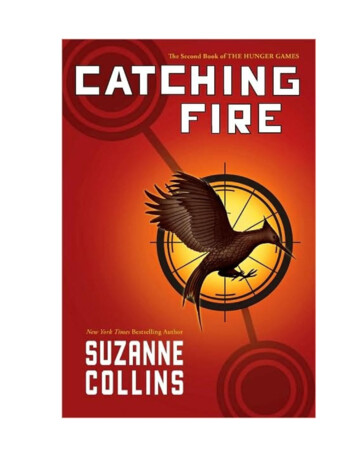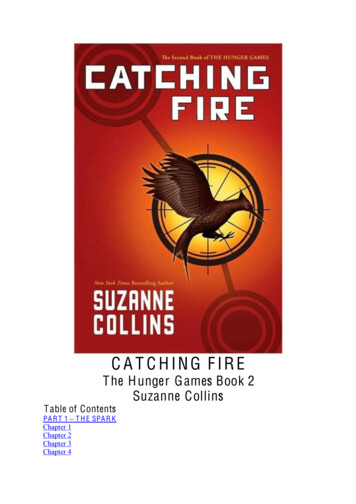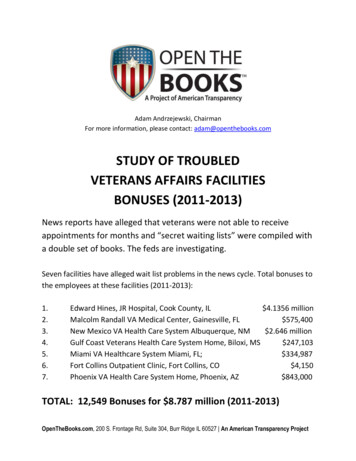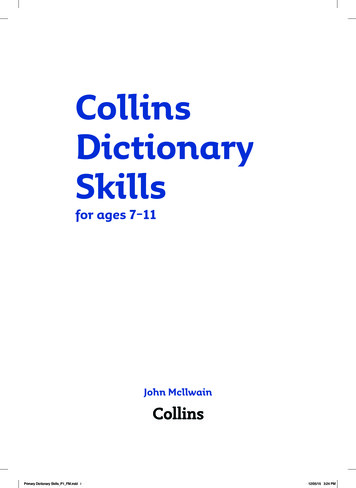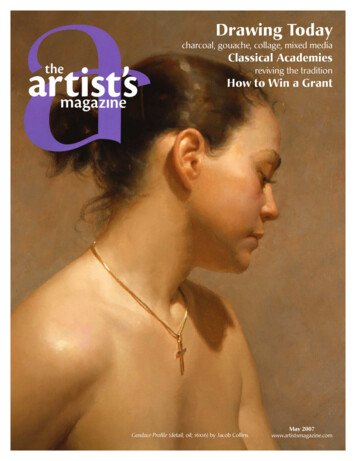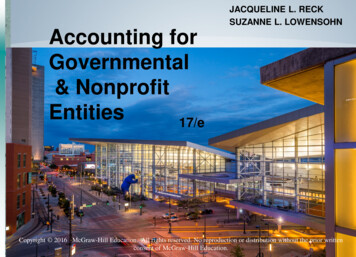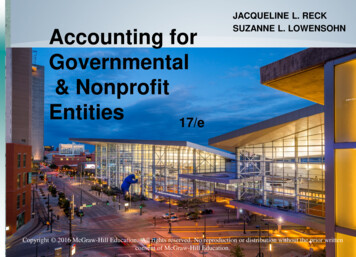
Transcription
The Hunger GamesbySuzanne CollinsGo to Table of Contents
CONTENTSDedicationPart I“The Tributes”Chapter 1Chapter 2Chapter 3Chapter 4Chapter 5Chapter 6Chapter 7Chapter 8Chapter 9Part II“The Games”Chapter 10
Chapter 11Chapter 12Chapter 13Chapter 14Chapter 15Chapter 16Chapter 17Chapter 18PART III"THE VICTOR"Chapter 19Chapter 20Chapter 21Chapter 22Chapter 23
Chapter 24Chapter 25Chapter 26Chapter 27End of Table of Contents
For James Proimos
PART I"THE TRIBUTES"Chapter 1.When I wake up, the other side of the bed is cold. Myfingers stretch out, seeking Prim’s warmth but findingonly the rough canvas cover of the mattress. She musthave had bad dreams and climbed in with our mother. Ofcourse, she did. This is the day of the reaping.I prop myself up on one elbow. There’s enough light inthe bedroom to see them. My little sister, Prim, curled upon her side, cocooned in my mother’s body, their cheekspressed together. In sleep, my mother looks younger,still worn but not so beaten-down. Prim’s face is as freshas a raindrop, as lovely as the primrose for which shewas named. My mother was very beautiful once, too. Orso they tell me.Sitting at Prim’s knees, guarding her, is the world’sugliest cat. Mashed-in nose, half of one ear missing, eyesthe color of rotting squash. Prim named him Buttercup,insisting that his muddy yellow coat matched the brightflower. He hates me. Or at least distrusts me. Even
though it was years ago, I think he still remembers how Itried to drown him in a bucket when Prim brought himhome. Scrawny kitten, belly swollen with worms,crawling with fleas. The last thing I needed was anothermouth to feed. But Prim begged so hard, cried even, Ihad to let him stay. It turned out okay. My mother got ridof the vermin and he’s a born mouser. Even catches theoccasional rat. Sometimes, when I clean a kill, I feedButtercup the entrails. He has stopped hissing at me.Entrails. No hissing. This is the closest we will ever cometo love.I swing my legs off the bed and slide into my huntingboots. Supple leather that has molded to my feet. I pullon trousers, a shirt, tuck my long dark braid up into acap, and grab my forage bag. On the table, under awooden bowl to protect it from hungry rats and catsalike, sits a perfect little goat cheese wrapped in basilleaves. Prim’s gift to me on reaping day. I put the cheesecarefully in my pocket as I slip outside.Our part of District 12, nicknamed the Seam, is usuallycrawling with coal miners heading out to the morningshift at this hour. Men and women with hunched
shoulders, swollen knuckles, many who have long sincestopped trying to scrub the coal dust out of their brokennails, the lines of their sunken faces. But today the blackcinder streets are empty. Shutters on the squat grayhouses are closed. The reaping isn’t until two. May aswell sleep in. If you can.Our house is almost at the edge of the Seam. I only haveto pass a few gates to reach the scruffy field called theMeadow. Separating the Meadow from the woods, in factenclosing all of District 12, is a high chain-link fencetopped with barbed-wire loops. In theory, it’s supposedto be electrified twenty-four hours a day as a deterrent tothe predators that live in the woods — packs of wilddogs, lone cougars, bears — that used to threaten ourstreets. But since we’re lucky to get two or three hours ofelectricity in the evenings, it’s usually safe to touch. Evenso, I always take a moment to listen carefully for thehum that means the fence is live. Right now, it’s silent asa stone. Concealed by a clump of bushes, I flatten out onmy belly and slide under a two-foot stretch that’s beenloose for years. There are several other weak spots in thefence, but this one is so close to home I almost alwaysenter the woods here.
As soon as I’m in the trees, I retrieve a bow and sheathof arrows from a hollow log. Electrified or not, the fencehas been successful at keeping the flesh-eaters out ofDistrict 12. Inside the woods they roam freely, and thereare added concerns like venomous snakes, rabid animals,and no real paths to follow. But there’s also food if youknow how to find it. My father knew and he taught mesome before he was blown to bits in a mine explosion.There was nothing even to bury. I was eleven then. Fiveyears later, I still wake up screaming for him to run.Even though trespassing in the woods is illegal andpoaching carries the severest of penalties, more peoplewould risk it if they had weapons. But most are not boldenough to venture out with just a knife. My bow is ararity, crafted by my father along with a few others that Ikeep well hidden in the woods, carefully wrapped inwaterproof covers. My father could have made goodmoney selling them, but if the officials found out hewould have been publicly executed for inciting arebellion. Most of the Peacekeepers turn a blind eye tothe few of us who hunt because they’re as hungry forfresh meat as anybody is. In fact, they’re among our bestcustomers. But the idea that someone might be armingthe Seam would never have been allowed.
In the fall, a few brave souls sneak into the woods toharvest apples. But always in sight of the Meadow.Always close enough to run back to the safety of District12 if trouble arises. “District Twelve. Where you canstarve to death in safety,” I mutter. Then I glance quicklyover my shoulder. Even here, even in the middle ofnowhere, you worry someone might overhear you.When I was younger, I scared my mother to death, thethings I would blurt out about District 12, about thepeople who rule our country, Panem, from the far-off citycalled the Capitol. Eventually I understood this wouldonly lead us to more trouble. So I learned to hold mytongue and to turn my features into an indifferent maskso that no one could ever read my thoughts. Do my workquietly in school. Make only polite small talk in the publicmarket. Discuss little more than trades in the Hob, whichis the black market where I make most of my money.Even at home, where I am less pleasant, I avoiddiscussing tricky topics. Like the reaping, or foodshortages, or the Hunger Games. Prim might begin torepeat my words and then where would we be?In the woods waits the only person with whom I can bemyself. Gale. I can feel the muscles in my face relaxing,
my pace quickening as I climb the hills to our place, arock ledge overlooking a valley. A thicket of berry bushesprotects it from unwanted eyes. The sight of him waitingthere brings on a smile. Gale says I never smile except inthe woods.“Hey, Catnip,” says Gale. My real name is Katniss, butwhen I first told him, I had barely whispered it. So hethought I’d said Catnip. Then when this crazy lynxstarted following me around the woods looking forhandouts, it became his official nickname for me. I finallyhad to kill the lynx because he scared off game. I almostregretted it because he wasn’t bad company. But I got adecent price for his pelt.“Look what I shot,” Gale holds up a loaf of bread with anarrow stuck in it, and I laugh. It’s real bakery bread, notthe flat, dense loaves we make from our grain rations. Itake it in my hands, pull out the arrow, and hold thepuncture in the crust to my nose, inhaling the fragrancethat makes my mouth flood with saliva. Fine bread likethis is for special occasions.“Mm, still warm,” I say. He must have been at the bakeryat the crack of dawn to trade for it. “What did it cost
you?”“Just a squirrel. Think the old man was feelingsentimental this morning,” says Gale. “Even wished meluck.”“Well, we all feel a little closer today, don’t we?” I say,not even bothering to roll my eyes. “Prim left us acheese.” I pull it out.His expression brightens at the treat. “Thank you, Prim.We’ll have a real feast.” Suddenly he falls into a Capitolaccent as he mimics Effie Trinket, the maniacally upbeatwoman who arrives once a year to read out the names atthe leaping. “I almost forgot! Happy Hunger Games!” Heplucks a few blackberries from the bushes around us.“And may the odds —” He tosses a berry in a high arctoward me.I catch it in my mouth and break the delicate skin withmy teeth. The sweet tartness explodes across mytongue. “— be ever in your favor!” I finish with equalverve. We have to joke about it because the alternativeis to be scared out of your wits. Besides, the Capitolaccent is so affected, almost anything sounds funny in it.
I watch as Gale pulls out his knife and slices the bread.He could be my brother. Straight black hair, olive skin,we even have the same gray eyes. But we’re not related,at least not closely. Most of the families who work themines resemble one another this way.That’s why my mother and Prim, with their light hair andblue eyes, always look out of place. They are. Mymother’s parents were part of the small merchant classthat caters to officials, Peacekeepers, and the occasionalSeam customer. They ran an apothecary shop in thenicer part of District 12. Since almost no one can afforddoctors, apothecaries are our healers. My father got toknow my mother because on his hunts he wouldsometimes collect medicinal herbs and sell them to hershop to be brewed into remedies. She must have reallyloved him to leave her home for the Seam. I try toremember that when all I can see is the woman who satby, blank and unreachable, while her children turned toskin and bones. I try to forgive her for my father’s sake.But to be honest, I’m not the forgiving type.Gale spreads the bread slices with the soft goat cheese,carefully placing a basil leaf on each while I strip thebushes of their berries. We settle back in a nook in the
rocks. From this place, we are invisible but have a clearview of the valley, which is teeming with summer life,greens to gather, roots to dig, fish iridescent in thesunlight. The day is glorious, with a blue sky and softbreeze. The food’s wonderful, with the cheese seepinginto the warm bread and the berries bursting in ourmouths. Everything would be perfect if this really was aholiday, if all the day off meant was roaming themountains with Gale, hunting for tonight’s supper. Butinstead we have to be standing in the square at twoo’clock waiting for the names to be called out.“We could do it, you know,” Gale says quietly.“What?” I ask.“Leave the district. Run off. Live in the woods. You and I,we could make it,” says Gale.I don’t know how to respond. The idea is sopreposterous.“If we didn’t have so many kids,” he adds quickly.They’re not our kids, of course. But they might as well
be. Gale’s two little brothers and a sister. Prim. And youmay as well throw in our mothers, too, because howwould they live without us? Who would fill those mouthsthat are always asking for more? With both of us huntingdaily, there are still nights when game has to be swappedfor lard or shoelaces or wool, still nights when we go tobed with our stomachs growling.“I never want to have kids,” I say.“I might. If I didn’t live here,” says Gale.“But you do,” I say, irritated.“Forget it,” he snaps back.The conversation feels all wrong. Leave? How could Ileave Prim, who is the only person in the world I’mcertain I love? And Gale is devoted to his family. We can’tleave, so why bother talking about it? And even if we did. . . even if we did . . . where did this stuff about havingkids come from? There’s never been anything romanticbetween Gale and me. When we met, I was a skinnytwelve-year-old, and although he was only two yearsolder, he already looked like a man. It took a long time
for us to even become friends, to stop haggling overevery trade and begin helping each other out.Besides, if he wants kids, Gale won’t have any troublefinding a wife. He’s good-looking, he’s strong enough tohandle the work in the mines, and he can hunt. You cantell by the way the girls whisper about him when hewalks by in school that they want him. It makes mejealous but not for the reason people would think. Goodhunting partners are hard to find.“What do you want to do?” I ask. We can hunt, fish, orgather.“Let’s fish at the lake. We can leave our poles and gatherin the woods. Get something nice for tonight,” he says.Tonight. After the reaping, everyone is supposed tocelebrate. And a lot of people do, out of relief that theirchildren have been spared for another year. But at leasttwo families will pull their shutters, lock their doors, andtry to figure out how they will survive the painful weeksto come.We make out well. The predators ignore us on a day
when easier, tastier prey abounds. By late morning, wehave a dozen fish, a bag of greens and, best of all, agallon of strawberries. I found the patch a few years ago,but Gale had the idea to string mesh nets around it tokeep out the animals.On the way home, we swing by the Hob, the blackmarket that operates in an abandoned warehouse thatonce held coal. When they came up with a more efficientsystem that transported the coal directly from the minesto the trains, the Hob gradually took over the space.Most businesses are closed by this time on reaping day,but the black market’s still fairly busy. We easily tradesix of the fish for good bread, the other two for salt.Greasy Sae, the bony old woman who sells bowls of hotsoup from a large kettle, takes half the greens off ourhands in exchange for a couple of chunks of paraffin. Wemight do a tad better elsewhere, but we make an effortto keep on good terms with Greasy Sae. She’s the onlyone who can consistently be counted on to buy wild dog.We don’t hunt them on purpose, but if you’re attackedand you take out a dog or two, well, meat is meat. “Onceit’s in the soup, I’ll call it beef,” Greasy Sae says with awink. No one in the Seam would turn up their nose at agood leg of wild dog, but the Peacekeepers who come to
the Hob can afford to be a little choosier.When we finish our business at the market, we go to theback door of the mayor’s house to sell half thestrawberries, knowing he has a particular fondness forthem and can afford our price. The mayor’s daughter,Madge, opens the door. She’s in my year at school. Beingthe mayor’s daughter, you’d expect her to be a snob, butshe’s all right. She just keeps to herself. Like me. Sinceneither of us really has a group of friends, we seem toend up together a lot at school. Eating lunch, sitting nextto each other at assemblies, partnering for sportsactivities. We rarely talk, which suits us both just fine.Today her drab school outfit has been replaced by anexpensive white dress, and her blonde hair is done upwith a pink ribbon. Reaping clothes.“Pretty dress,” says Gale.Madge shoots him a look, trying to see if it’s a genuinecompliment or if he’s just being ironic. It is a prettydress, but she would never be wearing it ordinarily. Shepresses her lips together and then smiles. “Well, if I endup going to the Capitol, I want to look nice, don’t I?”
Now it’s Gale’s turn to be confused. Does she mean it? Oris she messing with him? I’m guessing the second.“You won’t be going to the Capitol,” says Gale coolly. Hiseyes land on a small, circular pin that adorns her dress.Real gold. Beautifully crafted. It could keep a family inbread for months. “What can you have? Five entries? Ihad six when I was just twelve years old.”“That’s not her fault,” I say.“No, it’s no one’s fault. Just the way it is,” says Gale.Madge’s face has become closed off. She puts the moneyfor the berries in my hand. “Good luck, Katniss.” “You,too,” I say, and the door closes.We walk toward the Seam in silence. I don’t like thatGale took a dig at Madge, but he’s right, of course. Thereaping system is unfair, with the poor getting the worstof it. You become eligible for the reaping the day youturn twelve. That year, your name is entered once. Atthirteen, twice. And so on and so on until you reach theage of eighteen, the final year of eligibility, when yourname goes into the pool seven times. That’s true forevery citizen in all twelve districts in the entire country of
Panem.But here’s the catch. Say you are poor and starving aswe were. You can opt to add your name more times inexchange for tesserae. Each tessera is worth a meageryear’s supply of grain and oil for one person. You may dothis for each of your family members as well. So, at theage of twelve, I had my name entered four times. Once,because I had to, and three times for tesserae for grainand oil for myself, Prim, and my mother. In fact, everyyear I have needed to do this. And the entries arecumulative. So now, at the age of sixteen, my name willbe in the reaping twenty times. Gale, who is eighteenand has been either helping or single-handedly feeding afamily of five for seven years, will have his name inforty-two times.You can see why someone like Madge, who has neverbeen at risk of needing a tessera, can set him off. Thechance of her name being drawn is very slim comparedto those of us who live in the Seam. Not impossible, butslim. And even though the rules were set up by theCapitol, not the districts, certainly not Madge’s family, it’shard not to resent those who don’t have to sign up fortesserae.
Gale knows his anger at Madge is misdirected. On otherdays, deep in the woods, I’ve listened to him rant abouthow the tesserae are just another tool to cause misery inour district. A way to plant hatred between the starvingworkers of the Seam and those who can generally counton supper and thereby ensure we will never trust oneanother. “It’s to the Capitol’s advantage to have usdivided among ourselves,” he might say if there were noears to hear but mine. If it wasn’t reaping day. If a girlwith a gold pin and no tesserae had not made what I’msure she thought was a harmless comment.As we walk, I glance over at Gale’s face, still smolderingunderneath his stony expression. His rages seempointless to me, although I never say so. It’s not that Idon’t agree with him. I do. But what good is yelling aboutthe Capitol in the middle of the woods? It doesn’t changeanything. It doesn’t make things fair. It doesn’t fill ourstomachs. In fact, it scares off the nearby game. I lethim yell though. Better he does it in the woods than inthe district.Gale and I divide our spoils, leaving two fish, a couple ofloaves of good bread, greens, a quart of strawberries,salt, paraffin, and a bit of money for each.
“See you in the square,” I say.“Wear something pretty,” he says flatly.At home, I find my mother and sister are ready to go. Mymother wears a fine dress from her apothecary days.Prim is in my first reaping outfit, a skirt and ruffledblouse. It’s a bit big on her, but my mother has made itstay with pins. Even so, she’s having trouble keeping theblouse tucked in at the back.A tub of warm water waits for me. I scrub off the dirt andsweat from the woods and even wash my hair. To mysurprise, my mother has laid out one of her own lovelydresses for me. A soft blue thing with matching shoes.“Are you sure?” I ask. I’m trying to get past rejectingoffers of help from her. For a while, I was so angry, Iwouldn’t allow her to do anything for me. And this issomething special. Her clothes from her past are veryprecious to her.“Of course. Let’s put your hair up, too,” she says. I lether towel-dry it and braid it up on my head. I can hardlyrecognize myself in the cracked mirror that leans against
the wall.“You look beautiful,” says Prim in a hushed voice.“And nothing like myself,” I say. I hug her, because Iknow these next few hours will be terrible for her. Herfirst reaping. She’s about as safe as you can get, sinceshe’s only entered once. I wouldn’t let her take out anytesserae. But she’s worried about me. That theunthinkable might happen.I protect Prim in every way I can, but I’m powerlessagainst the reaping. The anguish I always feel when she’sin pain wells up in my chest and threatens to register onmy (ace. I notice her blouse has pulled out of her skirt inthe back again and force myself to stay calm. “Tuck yourtail in, little duck,” I say, smoothing the blouse back inplace.Prim giggles and gives me a small “Quack.”“Quack yourself,” I say with a light laugh. The kind onlyPrim can draw out of me. “Come on, let’s eat,” I say andplant a quick kiss on the top of her head.
The fish and greens are already cooking in a stew, butthat will be for supper. We decide to save thestrawberries and bakery bread for this evening’s meal, tomake it special we say. Instead we drink milk from Prim’sgoat, Lady, and eat the rough bread made from thetessera grain, although no one has much appetiteanyway.At one o’clock, we head for the square. Attendance ismandatory unless you are on death’s door. This evening,officials will come around and check to see if this is thecase. If not, you’ll be imprisoned.It’s too bad, really, that they hold the reaping in thesquare — one of the few places in District 12 that can bepleasant. The square’s surrounded by shops, and onpublic market days, especially if there’s good weather, ithas a holiday feel to it. But today, despite the brightbanners hanging on the buildings, there’s an air ofgrimness. The camera crews, perched like buzzards onrooftops, only add to the effect.People file in silently and sign in. The reaping is a goodopportunity for the Capitol to keep tabs on the populationas well. Twelve-through eighteen-year-olds are herded
into roped areas marked off by ages, the oldest in thefront, the young ones, like Prim, toward the back. Familymembers line up around the perimeter, holding tightly toone another’s hands. But there are others, too, who haveno one they love at stake, or who no longer care, whoslip among the crowd, taking bets on the two kids whosenames will be drawn. Odds are given on their ages,whether they’re Seam or merchant, if they will breakdown and weep. Most refuse dealing with the racketeersbut carefully, carefully. These same people tend to beinformers, and who hasn’t broken the law? I could beshot on a daily basis for hunting, but the appetites ofthose in charge protect me. Not everyone can claim thesame.Anyway, Gale and I agree that if we have to choosebetween dying of hunger and a bullet in the head, thebullet would be much quicker.The space gets tighter, more claustrophobic as peoplearrive.The square’s quite large, but not enough to hold District12’s population of about eight thousand. Latecomers aredirected to the adjacent streets, where they can watchthe event on screens as it’s televised live by the state.
I find myself standing in a clump of sixteens from theSeam. We all exchange terse nods then focus ourattention on the temporary stage that is set up beforethe Justice Building. It holds three chairs, a podium, andtwo large glass balls, one for the boys and one for thegirls. I stare at the paper slips in the girls’ ball. Twenty ofthem have Katniss Everdeen written on them in carefulhandwriting.Two of the three chairs fill with Madge’s father, MayorUndersee, who’s a tall, balding man, and Effie Trinket,District 12’s escort, fresh from the Capitol with her scarywhite grin, pinkish hair, and spring green suit. Theymurmur to each other and then look with concern at theempty seat.Just as the town clock strikes two, the mayor steps up tothe podium and begins to read. It’s the same story everyyear. He tells of the history of Panem, the country thatrose up out of the ashes of a place that was once calledNorth America. He lists the disasters, the droughts, thestorms, the fires, the encroaching seas that swallowed upso much of the land, the brutal war for what littlesustenance remained. The result was Panem, a shiningCapitol ringed by thirteen districts, which brought peace
and prosperity to its citizens. Then came the Dark Days,the uprising of the districts against the Capitol. Twelvewere defeated, the thirteenth obliterated. The Treaty ofTreason gave us the new laws to guarantee peace and,as our yearly reminder that the Dark Days must never berepeated, it gave us the Hunger Games.The rules of the Hunger Games are simple. Inpunishment for the uprising, each of the twelve districtsmust provide one girl and one boy, called tributes, toparticipate. The twenty-four tributes will be imprisoned ina vast outdoor arena that could hold anything from aburning desert to a frozen wasteland.Over a period of several weeks, the competitors mustfight to the death. The last tribute standing wins.Taking the kids from our districts, forcing them to kill oneanother while we watch — this is the Capitol’s way ofreminding us how totally we are at their mercy. How littlechance we would stand of surviving another rebellion.Whatever words they use, the real message is clear.“Look how we take your children and sacrifice them andthere’s nothing you can do. If you lift a finger, we willdestroy every last one of you. Just as we did in District
Thirteen.”To make it humiliating as well as torturous, the Capitolrequires us to treat the Hunger Games as a festivity, asporting event pitting every district against the others.The last tribute alive receives a life of ease back home,and their district will be showered with prizes, largelyconsisting of food. All year, the Capitol will show thewinning district gifts of grain and oil and even delicacieslike sugar while the rest of us battle starvation.“It is both a time for repentance and a time for thanks,”intones the mayor.Then he reads the list of past District 12 victors. Inseventy-four years, we have had exactly two. Only one isstill alive. Haymitch Abernathy, a paunchy, middle-agedman, who at this moment appears hollering somethingunintelligible, staggers onto the stage, and falls into thethird chair. He’s drunk. Very. The crowd responds with itstoken applause, but he’s confused and tries to give EffieTrinket a big hug, which she barely manages to fend off.The mayor looks distressed. Since all of this is being
televised, right now District 12 is the laughingstock ofPanem, and he knows it. He quickly tries to pull theattention back to the reaping by introducing Effie Trinket.Bright and bubbly as ever, Effie Trinket trots to thepodium and gives her signature, “Happy Hunger Games!And may the odds be ever in your favor!” Her pink hairmust be a wig because her curls have shifted slightlyoff-center since her encounter with Haymitch. She goeson a bit about what an honor it is to be here, althougheveryone knows she’s just aching to get bumped up to abetter district where they have proper victors, not drunkswho molest you in front of the entire nation.Through the crowd, I spot Gale looking back at me with aghost of a smile. As reapings go, this one at least has aslight entertainment factor. But suddenly I am thinking ofGale and his forty-two names in that big glass ball andhow the odds are not in his favor. Not compared to a lotof the boys. And maybe he’s thinking the same thingabout me because his face darkens and he turns away.“But there are still thousands of slips,” I wish I couldwhisper to him.It’s time for the drawing. Effie Trinket says as she always
does, “Ladies first!” and crosses to the glass ball with thegirls’ names. She reaches in, digs her hand deep into theball, and pulls out a slip of paper. The crowd draws in acollective breath and then you can hear a pin drop, andI’m feeling nauseous and so desperately hoping that it’snot me, that it’s not me, that it’s not me.Effie Trinket crosses back to the podium, smoothes theslip of paper, and reads out the name in a clear voice.And it’s not me.It’s Primrose Everdeen.End of Chapter
Chapter 2.One time, when I was in a blind in a tree, waitingmotionless for game to wander by, I dozed off and fellten feet to the ground, landing on my back. It was as ifthe impact had knocked every wisp of air from my lungs,and I lay there struggling to inhale, to exhale, to doanything.That’s how I feel now, trying to remember how tobreathe, unable to speak, totally stunned as the namebounces around the inside of my skull. Someone isgripping my arm, a boy from the Seam, and I thinkmaybe I started to fall and he caught me.There must have been some mistake. This can’t behappening. Prim was one slip of paper in thousands! Herchances of being chosen so remote that I’d not evenbothered to worry about her. Hadn’t I done everything?Taken the tesserae, refused to let her do the same? Oneslip. One slip in thousands. The odds had been entirely inher favor. But it hadn’t mattered.Somewhere far away, I can hear the crowd murmuring
unhappily as they always do when a twelve-year-old getschosen because no one thinks this is fair. And then I seeher, the blood drained from her face, hands clenched infists at her sides, walking with stiff, small steps uptoward the stage, passing me, and I see the back of herblouse has become untucked and hangs out over herskirt. It’s this detail, the untucked blouse forming aducktail, that brings me back to myself.“Prim!” The strangled cry comes out of my throat, andmy muscles begin to move again. “Prim!” I don’t need toshove through the crowd. The other kids make wayimmediately allowing me a straight path to the stage. Ireach her just as she is about to mount the steps. Withone sweep of my arm, I push her behind me.“I volunteer!” I gasp. “I volunteer as tribute!”There’s some confusion on the stage. District 12 hasn’thad a volunteer in decades and the protocol has becomerusty. The rule is that once a tribute’s name has beenpulled from the ball, another eligible boy, if a boy’s namehas been read, or girl, if a girl’s name has been read, canstep forward to take his or her place. In some districts, inwhich winning the reaping is such a great honor, people
are eager to risk their lives, the volunteering iscomplicated. But in District 12, where the word tribute ispretty much synonymous with the word corpse,volunteers are all but extinct.“Lovely!” says Effie Trinket. “But I believe there’s a smallmatter of introducing the reaping winner and then askingfor volunteers, and if one does come forth then we, um . .” she trails off, unsure herself.“What does it matter?” says
as a raindrop, as lovely as the primrose for which she was named. My mother was very beautiful once, too. Or so they tell me. . skin and bones. I try to forgive her for my father’s sake. But to be honest, I’m not the forgiving type.

